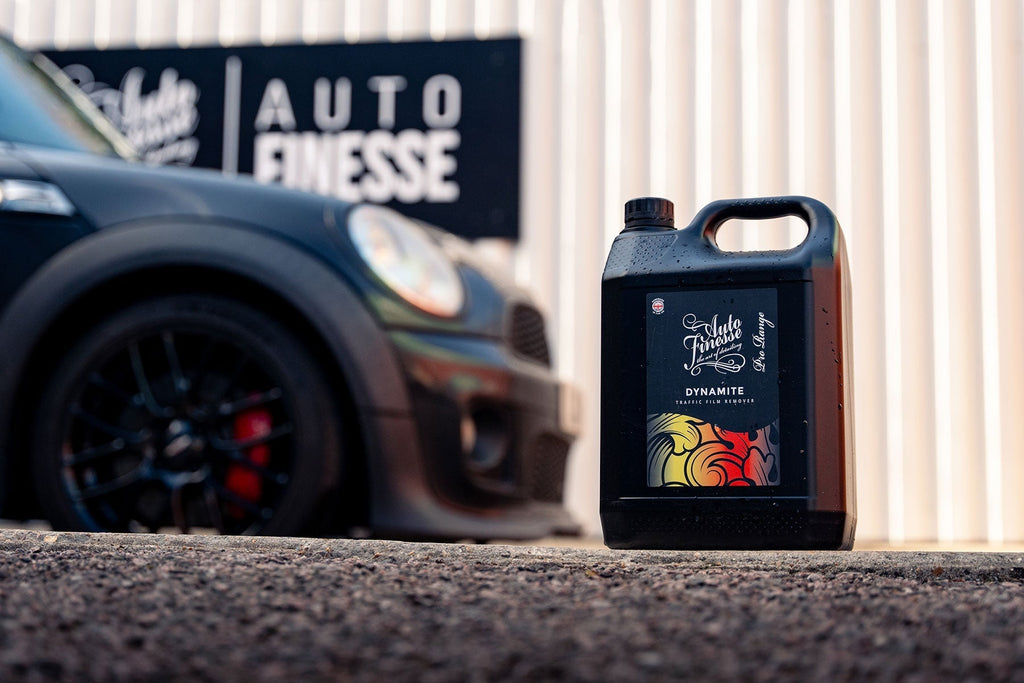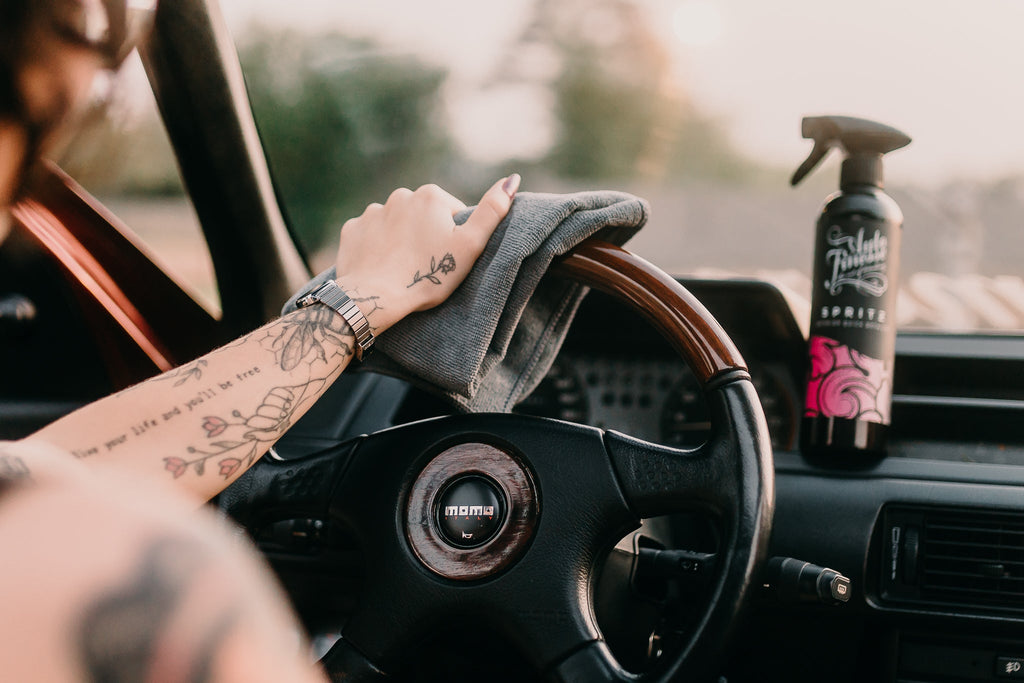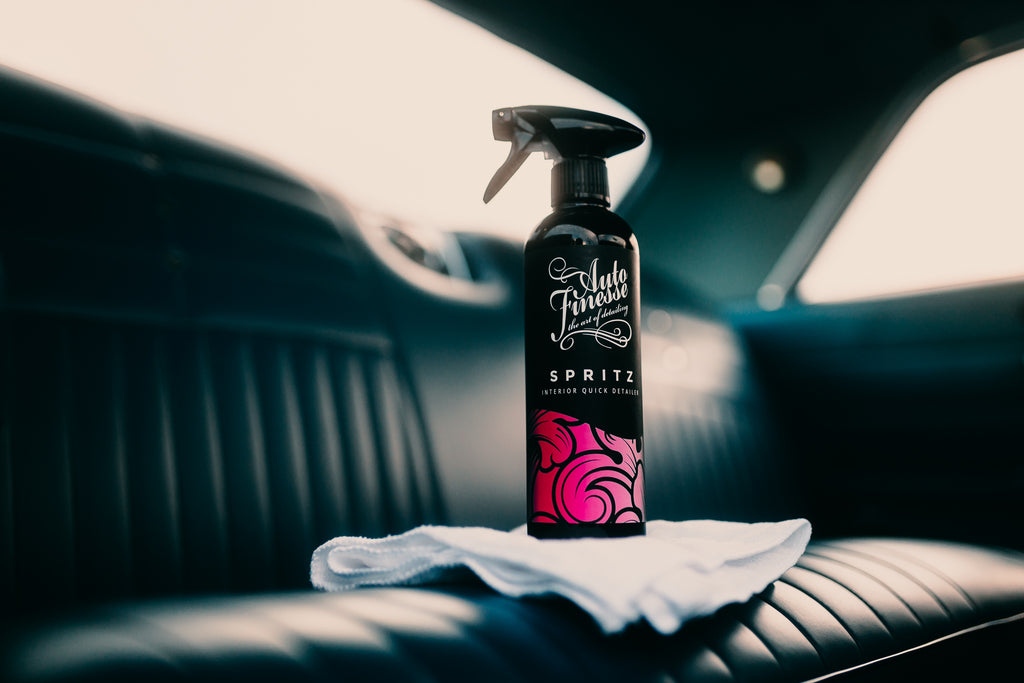The Detailers Guide to Cleaning Alloy Wheels

IN THIS FREE GUIDE…
- Discover the differences in specialist wheel finishes and the safe products to use when cleaning
- See how to give your alloys the best protection
- Learn about different processes from show washing and decontamination to deep-cleaning and ceramic coating

WHY IS IT IMPORTANT TO CLEAN AND PROTECT YOUR WHEELS?
- Contaminants like baked-on brake dust can cause corrosion, eventually leading to structural failure
- Wheels come into more contact with harsh grime and roads salt than any other part of your vehicle
- Because protecting your investment is never a bad idea!
THE ONLY PART OF YOUR VEHICLE TO ACTUALLY TOUCH THE ROAD!
Wheels, here at Auto Finesse they make our world go around, quite literally. But, whether you're into your posh aftermarket alloys or prefer to keep yours as the car manufacturers intended, there's no denying that cleaning your wheels is one of the most important jobs in detailing. It's the first part of any wash stage, the very first detailing process in fact, and for the most part you will clean your wheels every time you wash your car. But that said, what products should you use? How should they be applied? And why should you wash your wheels at all if they're just going to get dirty over and over again? Well, here's all you need to know…

WHY IS CLEANING WHEELS SO IMPORTANT?
First and foremost, cleaning and protecting your wheels is as much about maintenance and safety as it is aesthetics. This is because, if left for long enough, heavy fallout and other contaminants pose a very real threat to the alloy structure.
When you think about it too, your wheels and tyres are the only bit of your car to actually come in direct contact with the road. There's no other part that has to stand up to such extreme contamination and temperature fluctuations, either. This is why the vast majority of wheels out there are painted or powdercoated; simply to offer the durability needed to make them practical all-year-round, in the most extreme weather conditions. This type of finishing is included on standard wheels, along with the vast majority of cast, flow-formed and forged aftermarket wheels. Protective paint, powdercoat and lacquer layers are applied - much like the paintwork which protects the metal panels on the rest of your car - to keep grime, road salt and other deposits away from the metal surfaces, preventing damage caused by oxidation. But, this only works up to a point. When it comes to harsh contaminants (particularly the ferrous deposits found in brake dust), when left for extended periods they will not only eat through these protective layers, but eventually into the aluminium alloy, too. In the case of wheels, it's a problem compounded by the sheer volume of contact with hot metal contaminants, road salt and grime, and these can go on to compromise the structure, often resulting in irreversible damage. Obviously, this problem can occur exponentially quicker with specialist finishes (such as bare-metal, chrome and anodised wheels), because often there's no initial paint or powdercoat protection at all.
The good news though, is that all this can be avoided by cleaning contaminants away effectively in the first place. The only reason you'll need a suitable cleaning product for this is because many of the more hardcore pollutants can't be eradicated without intense chemical removal.



CHOOSE YOUR PRODUCTS WISELY
So, we know that you'll always need a relatively heavy-duty cleaner to remove baked-on grime and brake dust, but sheer power isn't the only consideration when finding the best product for your specific wheels. Along with the level of contamination, both wheel finish and design can make a real difference to the product you choose and its application...

CLEANING PAINTED AND POWDERCOATED WHEELS
For most of the alloys out there - assuming there is no curbing, corrosion or damage to the protective layers - all of our mainstay wheel cleaners, Imperial Wheel Cleaner, Reactive Wheel Cleaner and Revolution Wheel Soap, are suitable for regular use. These will readily dissolve brake dust, grime and other contaminants allowing them to be blasted away with a pressure washer. These products are similarly gentle on surfaces, too, and will not strip wheel waxes, sealants and ceramic wheel coatings. The difference between them is all in the application.
Imperial Wheel Cleaner and Reactive Wheel Cleaner are spray-on products, designed to linger and break down grime and remove brake dust, while Revolution Wheel Soap is a mild shampoo designed to be applied and agitated with a brush and dedicated wash mitt. These can be both used as stand-alone products, or in conjunction with one another for the ultimate clean.






DECONTAMINATING PAINTED AND POWDERCOATED WHEELS
Iron Out Contaminant Remover - another spray-on product - isn't strictly a dedicated wheel cleaner, but is extremely effective when used as such. This product is particularly ideal for use on heaver fallout during periodical decontamination washes. Iron Out isn't for use every time you clean your wheels of course, think of it more as an occasional decon product that's just effective for removing ingrained metal particles on wheels as it is on paintwork.



SPECIALIST FINISHES
As you'd expect, some wheel finishes require a little more care and maintenance than others - the specific reason that many enthusiasts prefer to run the most expensive rims during the summer months only, or on garaged show cars rather than daily drivers. Here we're talking about those with bare metal surfaces, along with magnesium wheels, or chrome and anodised finishes. In most cases, protection of the surface finish will outweigh the desire for the most powerful detergents and fallout removers, meaning these types of wheel will benefit from the gentlest cleaners like Revolution Wheel Soap. For light soiling - and let's face it, most of the time these sort of wheels only ever get lightly soiled - you can also use Verso All Purpose Cleaner or Citrus Power Bug & Grime Remover as washing detergents, along with Mercury Metal Polish to clean and shine any bare metal areas, particularly lips and dishes.
It's worth bearing in mind that all may not be what it seems with many a specialist finish. Most wheels that appear to be polished, adonised or chrome are actually painted. Or, at the very least, lacquered for protection. True chrome wheels for example, are rare and very expensive, so most chrome finishes are actually a kind of chrome paint. The majority of adonised wheels will be clear-coated from the factory to help fight against staining and corrosion. And, the same can be said for polished finishes, most commonly metal lips and dishes. The easiest way to check of your lips are actually bare metal is by using a sponge applicator to apply a little Mercury Metal Polish to a small section. If they're unlacquered, the polish will quickly react with the metal turning black on the pad.




WHEEL DESIGN
The last thing to consider when choosing your perfect product is wheel design, simply because we all know that some wheels are far more intricate than others. Flat faced and 5-spoke wheel designs for example, may lend themselves better to different cleaning processes and products than intricate multi-spoke and mesh wheels. More often than not this will come down to the physical characteristics of the cleaning product, along with how it's applied.
In the case of our spray-on wheel cleaners, these are relatively thin liquid designed to physically work their way into tight recesses and lift away grime. While Revolution Wheel Soap makes a solution that can be brushed into the most intricate areas, gently deep-cleaning the hardest-to-reach areas and around wheel bolts. Conversely, Iron Out is a thicker liquid designed to linger on surfaces to react with metal deposits, dissolving and allowing them to be rinsed away.



SHOW WASHING
In some cases - let's say, you've just had a short drive to an event - all it will take to have your wheels fighting fresh is a simple show wash. Granted this should only be performed on the lightest of soiling, but washing with minimal water and a small amount of Finale Quick Detailer can be extremely effective when time (and indeed water) is tight
Simply add around 50ml to every litre of clean water in a Detailing Bucket, apply and agitate the solution with a Detailing Brush and a wash mitt, and immediately dry off with an Ultra Plush Microfibre cloth. It doesn't get any easier than that, does it?




PROTECTION
It's a commonly overlooked process admittedly, but you always protect your paintwork, right? So, why wouldn't you protect wheels? Arguably these need even more help than the rest of the car! The idea here is to create an invisible barrier against all the harmful contamination, a professional trick that not only protects the paint and metal layers underneath, but also makes your wheels so much easier to clean the next time around. If you can stop the grime sticking, it'll simply slide off with very little product needed when you clean - makes sense, eh?
The truth is that wheel sealants and coatings are some of the most useful detailing products out there, our Mint Rims Wheel Wax for one has been an enthusiast staple for years now. Offering 2-3 months durability, this layerable, synthetic sealant not only adds a good degree of lustre, but protects from hot, abrasive brake dust and oxidisation by simply stopping contaminants from adhering. Our latest protection product - the Caramics Wheel Protection Kit - is another masterstroke. This, much like the rest of the Caramics range, is designed to make professional-style ceramic coating easy at home. In the case of wheels, a simple spray and wipe application will give you up to 12 months of extreme protection.
As always with wheels, there's one last thing to bear in mind, and it's to treat the surfaces you can't see just as lovingly as the wheel faces. In other words; adding protection in areas like the inner barrels and behind spokes whenever possible is never a bad idea, they're just as susceptible to contamination.
A top tip is to do your best to protect wheels from the off, whether that's before you fit them to the car (in the case of brand-new wheels), or if your wheels have just come back from a referb. A good layer or two of protection applied to the whole wheel should see you in good stead for any cleaning in the future




DO IT THE AUTO FINESSE WAY…
Many have their own method for cleaning wheels, but over the years we've found the perfect, no-nonsense way to do the job easily and effectively on the vast majority of lacquered and powdercoated wheels. Looking for a professional-level wheel clean every time you wash your car? Try this…
STEP 1: DECONTAMINATION WITH IRON OUT
First thing's first, do your wheels need deep-cleaning and decontamination? Then you need Iron Out, our pH neutral contaminant remover. We wouldn't recommend using this supremely powerful formula on every maintenance wash, but, say you wash your daily driver weekly, then once a month with Iron Out should be sufficient to keep deep ingrained contaminants at bay. Iron Out works by reacting with the ferrous particles that burn themselves into the surface of paint, powdercoat or lacquer. This reaction chemically dissolves all metal contamination, temporarily highlighting it red and creating an colloid (solid particles suspended in a liquid) that can be rinsed away with your pressure washer.
Simply spray on, let Iron out do all the work, and rinse off.




STEP 2: PRE-WASH WITH IMPERIAL
Most of the time this will be Step 1, of course. Imperial is our spray-on wheel cleaner that's safe for regular use on maintenance washes. Even though the non-acidic formula is tough on brake dust, grease and grime, it's non-acidic so it won't strip wheel sealants… in fact, it's mild enough to use for cleaning tyre walls, too.
Like paintwork, wheels will always benefit from a spot of pre-washing, so first remove any loose dirt and mud by giving them a rinse with your pressure washer. Then you can spray Imperial Wheel Cleaner liberally over the entire wheel, leave to dwell for a couple of minutes, and rinse off.


STEP 3: ADD REVOLUTION
Now on to the details, for heavy soiling a second application of Imperial can be agitated by "brushing-in'. This will be effective for removing the last of the baked-on grime, especially in the hard-to-reach and more fiddly parts of the wheel. To make life even easier though, we've found that doubling-up - by brushing-in Imperial with a solution of Revolution Wheel Soap - yields the very best results. Revolution is an advanced deep cleaning formula that will break down grime, but it's so gentle that it's also ideal for stand-alone use on specialist finishes. Whatever type of wheel you're using your Revolution Wheel Soap on, simply add approximately 2-3 capfuls to your bucket of water, and you're ready go.


STEP 4: BRUSH-IN
This is where you get to break out the big guns - your Barrel Brush (or Mini Barrel Brush). Very often the inner barrels are the grimiest part of any wheel, so we like to thoroughly clean these first, using plenty of the Revolution solution to Brush-in the previously applied Imperial. Once your barrels have been cleansed of all heavy soiling, we like to move on to the spokes, lips, boltholes and any other awkward areas using a suitable soft Detailing Brush. Last grab a wash mitt and use your Revolution bucket to clean the faces, behind the spokes, any other awkward recesses and give the rest of the wheel a final once over. When you have agitated every surface, you can rinse thoroughly.


STEP 5: DRY AND PROTECT
You wouldn't leave your paintwork to air-dry, and it should be the same with your wheels. So, to prevent pooling, water spots and unsightly drying marks (which will need polishing out later), you'll need to make sure the faces and lips are dried. The best way is simply to mop up any water using an Ultra Plush Microfibre Cloth.
Only now that you've done the job properly and your wheels are spotless, can you move on to adding your favourite protection product to keep them that way for longer.










